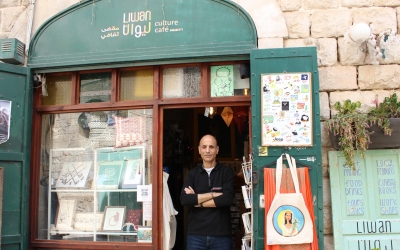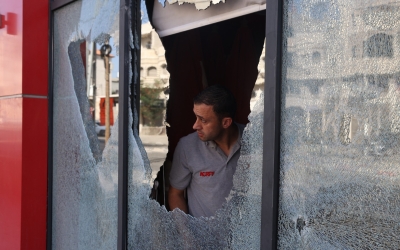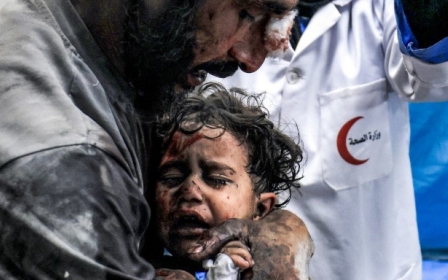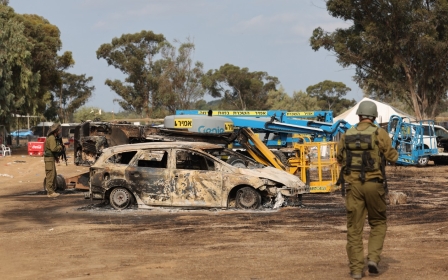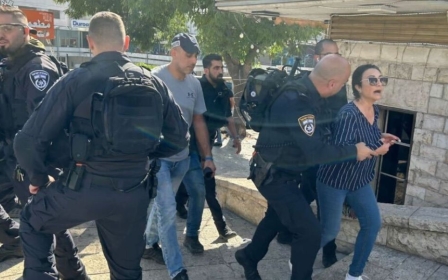Israel-Palestine war: An encounter with two bereaved Israeli peace activists in Jerusalem
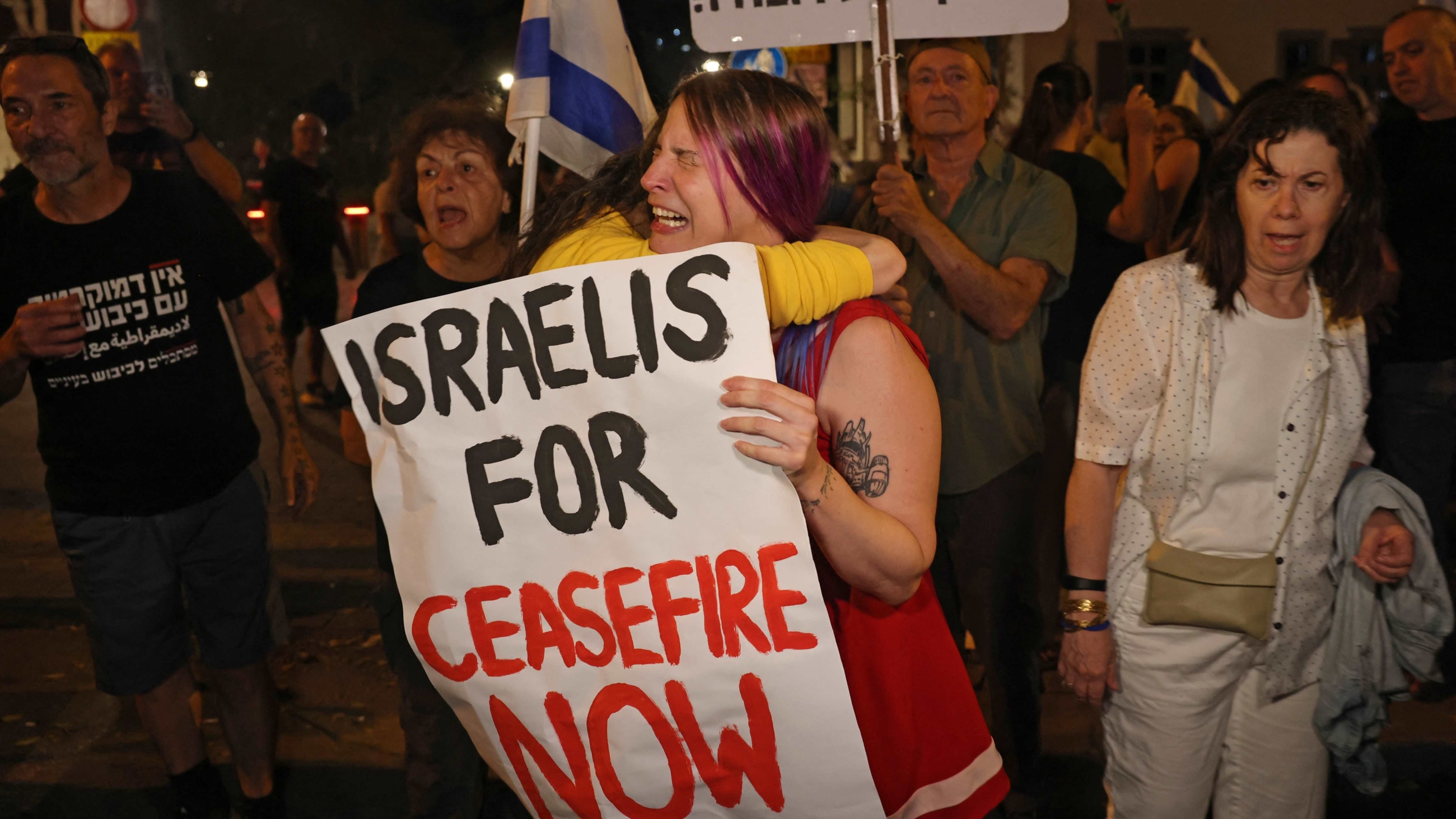
When a white tent was erected on 6 November in front of Israel's Knesset, it seemed like it would be taken back down immediately as Jerusalem municipal officials said it didn't have the necessary approvals.
But eventually one inspector signalled to the others to leave and the tent remained.
Maoz Yinon, Ya'akov Godo and their friends settled down with a clear statement: "Until Prime Minister Benjamin Netanyahu leaves, we will stay here."
The pair are familiar faces in the protest scene in Israel and are known as peace activists.
Together they protect Palestinian shepherds in the Jordan Valley region from settler violence, transport Palestinian children from Gaza and the West Bank to Israel for medical treatments, amongst other forms of activism.
New MEE newsletter: Jerusalem Dispatch
Sign up to get the latest insights and analysis on Israel-Palestine, alongside Turkey Unpacked and other MEE newsletters
Both men see Netanyahu as the major cause of the massacres of 7 October, which they say are a direct result of the free hand he gave settlers in the occupied West Bank.
Godo's eldest son and Yinon's parents were killed during the attack led by Hamas, yet both believe war, destruction and revenge are not the answer.
"I am a member of Kibbutz Naan; until a month ago I was the father of four sons, today I am the father of only three sons, as my eldest son, Tom, who was 52 years old, was killed in a Hamas attack in Kibbutz Kissufim," Godo said.
Follow Middle East Eye's live coverage for the latest on the Israel-Palestine war
"On the morning of 7 October, Tom, his wife and their three daughters were locked in a room sheltering for 25 hours, but Hamas fired at the door and one of the bullets killed Tom.
"His wife and the three daughters managed to flee and are in a hotel now with all the Kissufim evacuees," he said.
"She has no other home to return to, and she needs the mental support and occupational therapy she receives there."
Yinon says that it is impossible for him to express in words what he felt when he learned that his parents were murdered.
“I don't know the words for that. The worst that we didn't even dare to imagine – that is what happened,” he said.
‘Betrayed’
Yinon was born in Kibbutz Ruchama in the Negev desert in southern Israel, and later moved with his parents to Kibbutz Nativ Haasara, which is located at the northern border with the Gaza Strip.
Since 2005, he has been living in Binyamina near Haifa with his partner and their three children. From there, he founded and oversees a network of peace and social tourism initiatives. The collaborative effort involves Israeli Jews, Palestinians, and people from neighbouring Arab countries.
“In 2005 we opened a community social guest house in the old city of Nazareth when the city was still bleeding from the second intifada,” he explains, adding:
“It was a dangerous place, with drugs, crime and desolation. People were afraid to walk around the old city. But we found a wonderful city and that's how we opened the first guest house, and more and more places like this, of egalitarian, social, shared tourism - all owned by Palestinians in Israeli cities.
“I believe that the tourism business is an excellent tool for promoting understanding and peaceful relations.”
Asked if he felt betrayed in his peaceful outlook by the events of 7 October, Yinon does not hesitate to answer.
“Yes, I feel betrayed, not by Hamas, but by the State of Israel, by the prime minister and the government,” he says.
“Hamas did what any brutal extremist terrorist organisation is expected to do. But my parents and their neighbours warned all the time that something was going to happen,” he continues.
“They saw the training, the preparations and they alerted (the authorities) all the time, but Netanyahu did nothing, he abandoned them.
“Yes, the prime minister and the government betrayed me, betrayed my parents, betrayed all those people who were murdered there. Hamas did exactly what my parents warned they would do.
"What else is expected of a government than to provide the safety and personal life of its citizens? But they didn’t.”
Futility of war
Godo wears a T-shirt imprinted with the portrait of his murdered son and speaks very softly.
He sits in the tent surrounded by friends and strangers who are here to express their support.
“I am here with the aim of firing Bibi and to make sure that his government disappears from our lives,” Godo says.
'The essence of his policy was to nurture Hamas and weaken the PA'
- Ya’akov Godo, peace activist
“I say loud and clear that all the blood spilled on 7 October is on Netanyahu's hands and his head and on his entire government,” he adds.
“The sole responsibility for the fate of the abductees and captives is on him and on the entire State of Israel, as all he has done so far was only dividing our society.”
Like many other Israelis on the left, he accuses Netanyahu of “feeding the monster”, by seeing Hamas as a way of undermining the Palestinian Authority (PA).
“The essence of his policy was to nurture Hamas and weaken the PA as part of his project to take over Judea and Samaria (occupied West Bank) and to annex these territories,” says Godo.
Asked what the relationship between Israel and Gaza will look like when the war is over, Godo questions the effectiveness of a military solution despite his disdain for Hamas.
Despite numerous attempts to defeat Hamas, the outcomes remain unchanged and completely eliminating the organisation as a political force is improbable, he explains. He prefers an emphasis on self-governance in Gaza and the occupied West Bank and to avoid undermining one to strengthen control over the other.
For Yinon, things are even simpler.
“The first thing we’ve always believed in is a very strong military force. But now it’s been proven that in the face of terrorists, whose budget is barely one percent of the IDF’s, there still managed to be the biggest disaster that has happened to us since the Holocaust,” he says
“This is the concept of the crusaders: To arm themselves instead of reaching agreements and to live in peace with the neighbours. I am very afraid that if Israel continues with this mistaken concept, our next failure may be our last one,” he adds.
As for immediate priorities, Yinon says that clearly, the return of the abductees is the most urgent.
“After the return of the kidnapped, we must stop the war. Then get Netanyahu and his government out of our life, and then I will be available to convince myself and my children and all the people who hear me and read me, that the future can and will be better.
“I don’t want and I cannot deal with the political issues now, we have not buried all our dead yet, we have not cried enough yet”
For Godo, the most urgent thing to do now is to rebuild and restore Gaza and the Israeli villages along the border.
“And then to give trust, because what we are doing in Gaza and in Judea and Samaria completely does not inspire trust," he said.
“Clearly by now, the way of war is not the way, absolutely not. There are people there in Gaza, not all of them are murderers and monsters.”
Asked where he gets the strength to continue the struggle for peace, Godo says: “I believe that if people are given hope, a vision and a horizon, then they will live differently.”
Middle East Eye delivers independent and unrivalled coverage and analysis of the Middle East, North Africa and beyond. To learn more about republishing this content and the associated fees, please fill out this form. More about MEE can be found here.


